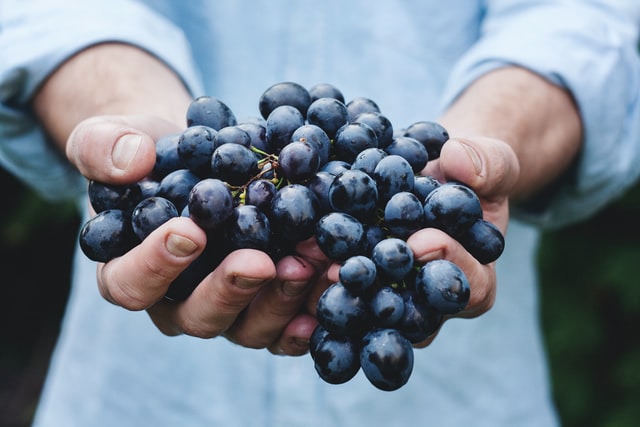A common nutritional tip is to “consume the rainbow.” This technique emphasises the need of consuming a variety of fruits and vegetables to get the necessary nutrients.
Dietitian Joyce Prescott, MS, RD, LD states that the compounds that give plants their vibrant hues might be very beneficial to your health. And fruits and vegetables on the purple end of the colour spectrum contain anthocyanin, a very nutritious chemical.
What exactly are anthocyanins?
Anthocyanins (an-tho-SY-uh-nins) are a group of pigments found in plants that are deep red, purple, and blue. They belong to the group of plant-based compounds known as flavonoids. In abundance in all plant components, including fruits, seeds, shoots, flowers, and leaves, are flavonoids. They defend plants from environmental stresses such as ultraviolet (UV) light, drought, and cold by attracting pollinators.
Prescott states that research indicates flavonoids are also potent nutrients, which may help explain why plant-based diets are regularly connected with health advantages. We believe this is partly owing to their antioxidant qualities.
Antioxidants eliminate unstable chemicals known as free radicals, which may cause cell damage. Free radicals are a natural byproduct of metabolism, as well as a consequence of environmental exposure to pollution, cigarette smoke, alcohol, sunshine, and toxic substances.
There are six primary kinds of anthocyanins among the 6,000 known flavonoids:
- Cyanidin.
- Delphinidin.
- Malvidin.
- Pelargonidin.
- Peonidin.
- Petunidin.
Where can you find anthocyanins?
Red, purple, blue, and black fruits, vegetables, and cereals are often high in anthocyanins. The greatest amounts are found in berries, including black elderberries and Aronia berries (chokeberries). Also, excellent sources include blueberries, blackberries, raspberries, and strawberries. Additional foods that are rich in anthocyanins include:
- Black plums, blood oranges, cherries, black and red grapes, and pomegranates are examples of fruits.
- Red cabbage, red onions, red radishes, purple cauliflower, purple maize, and purple eggplant peel are vegetables.
- Legumes and rice: black soy, black beans, and black rice.
- The beverages include grape juice and wine.
“The largest quantities of this colourful flavonoid are found in fresh and frozen versions of the mentioned meals,” writes Prescott. “There are also several kinds of anthocyanin-containing supplements available. Elderberry, Aronia, sour cherry, and blueberry extracts have grown more popular.”
What health advantages do anthocyanins offer?
Anthocyanin-rich foods are essential to a balanced diet. However, scientists continue to investigate their significance in treating and preventing certain illnesses. Overall, the research indicates that anthocyanins may provide a variety of health advantages.
Here are some recent discoveries:
Reducing blood pressure
A study of 66 research suggests that anthocyanins may help lower blood pressure. Participants with hypertension ingested a range of anthocyanin-containing plant extracts and preparations. The research discovered a consistent blood pressure-lowering effect. In other investigations, however, researchers discovered a variety of variables that contributed to inconsistent outcomes, including:
- Type and dosage of anthocyanin (food, juice, freeze-dried powder or extract).
- Quantity of dosages (single vs. long term).
- Patient characteristics (such as a person’s blood pressure at baseline and other health problems)
This study emphasises the need for more research to define a dosage protocol and identify individuals who may benefit from anthocyanin supplementation.
Reduces risk of cardiovascular disease
Atherosclerosis occurs when plaque accumulates within the arteries. This accumulation may lead to hypertension, heart attack, stroke, peripheral artery disease, and renal failure.
Plaque development is a multistage process influenced by several variables. According to Prescott, research indicates that anthocyanins may interfere in several phases of the process by reducing:
- Cholesterol is a significant element of plaque.
- High blood pressure may damage blood vessels and increase their susceptibility to atherosclerosis.
- Inflammation results in the production of plaques.
Prevents neurological disorders
Research indicates that anthocyanins preserve and enhance brain function:
- A daily intake of cherry juice enhanced speech and cognition in older adults with mild to severe dementia, according to one research.
- Another research found that anthocyanins enhanced blood flow to and stimulated memory, language, and attention-controlling brain regions.
Researchers attribute these advantages to the antioxidant and anti-inflammatory characteristics of anthocyanins.
Slows cancer development
Anthocyanins may inhibit or prevent cancer in several ways. According to studies, anthocyanins may:
- Prevent the DNA mutations that cause cancer.
- annihilate cancer cells or halt their development.
- Prevent tumours from becoming cancerous (cancerous).
- Reverse drug resistance and enhance the chemosensitivity of malignancies.
However, Prescott notes that the majority of studies on anthocyanins and cancer have been conducted in the laboratory. There are little human clinical study data available. Researchers must continue to explore these discoveries to establish precisely how anthocyanins impact the development and therapy of cancer.
How many anthocyanins should I consume on a daily basis?
While the findings of many of these research are intriguing, they do not provide clear guidelines for the daily amount of anthocyanin that should be consumed. In contrast to vital vitamins and minerals, there is no suggested daily intake.
“Your best plan is to include anthocyanin-rich foods into your normal diet,” advises Prescott. We know that these items are safe and may improve your overall diet.
Should I take supplemental anthocyanins?
The usage of anthocyanin supplements is not supported by convincing data. While dietary supplements are readily accessible and claim to provide several health advantages, there is often a lack of supporting evidence for their usage.
If you are contemplating taking an anthocyanin supplement, Prescott advises you to consult with your physician. It is essential to ensure that the supplement will not interact with your existing drugs. Based on your health and medical history, your healthcare practitioner may also help you choose whether a supplement is an appropriate decision for you.
